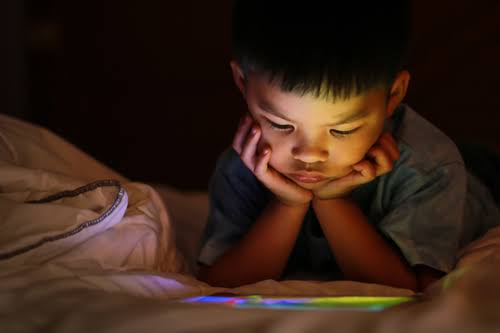The combination of excessive sugar intake and prolonged screen time is a modern health crisis for children. It leads to physical issues like obesity and diabetes, hampers mental health, and disrupts sleep. Together, these factors create a vicious cycle that significantly impacts children’s overall well-being, making it essential for parents to set boundaries.

1. Sugar: The Sweet Villain
Sugar is everywhere – in candies, sodas, and even in foods you wouldn’t suspect, like sauces and bread. Excessive sugar consumption leads to several health issues:
- Obesity: Sugar is high in calories but lacks nutrients. Over time, excess calorie intake contributes to unhealthy weight gain.
- Tooth Decay: Sugar feeds harmful bacteria in the mouth, leading to cavities.
- Diabetes Risk: High sugar intake overworks the pancreas, potentially leading to insulin resistance and Type 2 diabetes.
- Mood Swings: Sugar can cause a temporary energy boost, followed by a crash, leading to irritability and fatigue.
2. Screen Time: The Digital Monster
Screen time refers to the hours spent watching TV, playing video games, or using phones and tablets. While technology has its benefits, overuse comes with consequences:
- Sedentary Lifestyle: Excessive screen time means less physical activity, which contributes to weight gain and weak muscles.
- Poor Posture: Sitting hunched over screens can lead to posture problems and back pain.
- Eye Strain: Staring at screens for long periods can cause
- digital eye strain, headaches, and even long-term vision problems.
- Mental Health Issues: Too much screen time is linked to anxiety, depression, and reduced attention spans.
- 3. The Dangerous Duo: Sugar and Screen Time Combined
- When children snack on sugary treats while glued to screens, the health risks multiply:
- Overeating: Screen distractions prevent kids from paying attention to their hunger cues, leading to overeating.
- Sleep Disruption: Both sugar and screen time interfere with sleep. Sugar causes energy spikes, and screens emit blue light that disrupts melatonin production, making it harder to fall asleep.
- Behavioral Issues: The mix of sugar highs and screen overstimulation can make children irritable and hyperactive.
- Weak Immunity: Poor sleep and unhealthy eating habits weaken the immune system, making kids more prone to illnesses.
- Long-Term Consequences
- If not addressed, the combination of sugar and excessive screen time can lead to:
- Chronic Diseases: Obesity, diabetes, and heart issues often begin in childhood and persist into adulthood.
- Academic Challenges: Reduced concentration and energy levels impact school performance.
- Social Withdrawal: Spending too much time on screens reduces real-life social interactions, affecting emotional intelligence.
- Practical Solutions for Parents
- As your grandma, I know it’s not easy to limit sugar and screen time. But with love and patience, you can guide your children toward healthier habits. Here’s how:
- 1. Create a Balanced Diet
- Healthy Snacks: Offer fruits, nuts, yogurt, and whole-grain snacks instead of sugary treats.
- Home-Cooked Meals: Preparing meals at home allows you to control sugar content.
- Read Labels: Check for hidden sugars in packaged foods.
- 2. Set Screen Time Limits
- Daily Cap: Limit recreational screen time to 1-2 hours per day.
- Tech-Free Zones: Keep screens out of bedrooms and dining areas.
- Encourage Alternatives: Promote hobbies like reading, drawing, or playing outdoor games.
- 3. Combine Food and Activities
- Active Snacks: Combine snacks with physical activities, like having a picnic in the park.
- Cooking Together: Involve kids in preparing healthy meals to make it fun.
- 4. Prioritize Sleep
- Bedtime Routine: Establish a calming bedtime routine without screens.
- No Late-Night Snacks: Avoid sugary foods close to bedtime.
- 5. Be a Role Model
- Children learn by example. If they see you enjoying healthy food and balancing screen time, they’ll follow suit.
- Q&A Section
- Ques 1: How much sugar is safe for kids?
- Ans: The American Heart Association recommends that children consume less than 25 grams (6 teaspoons) of added sugar per day.
- Ques 2: What is the ideal amount of screen time for kids?
- Ans: For children aged 6 and older, the American Academy of Pediatrics suggests no more than 1-2 hours of recreational screen time daily.
- Ques 3: Can occasional treats and screen time be okay?
- Ans: Yes, moderation is key. An occasional treat or movie night won’t harm if balanced with healthy habits.
- Ques 4: How can I make screen time educational?
- Ans: Choose educational apps, documentaries, and interactive learning games. Co-view or discuss content to make it engaging.
- Ques 5: My child resists limits. What should I do?
- Ans: Start with small changes and involve them in setting rules. Explain why these limits are for their benefit, and be consistent.